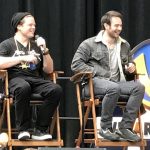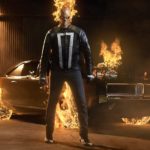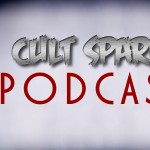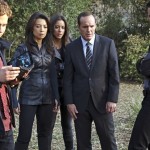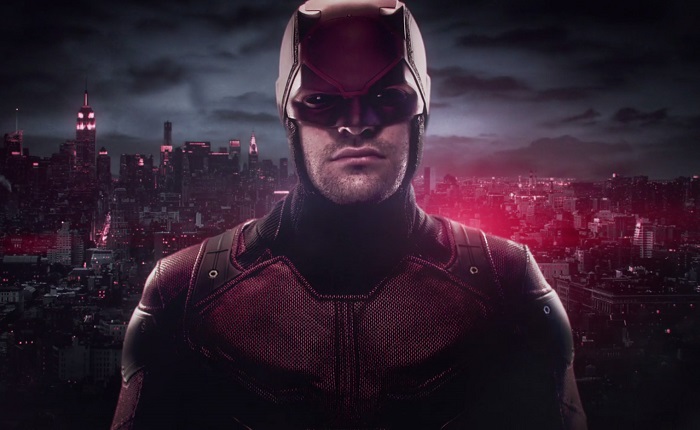
A useful shorthand for film and TV critics is to compare whatever they just watched to something most people have already seen. But what should we compare Daredevil to? Should we compare it to other movies and shows of the Marvel Cinematic Universe, as Netflix's new superhero series takes place in the same continuity as The Avengers and Agents of S.H.I.E.L.D.? Or would it be better to compare Daredevil to Batman Begins, the superhero film that it borrows from the most liberally? Or should we compare it to other TV dramas, either DC's small-screen comic-book endeavors, Arrow and The Flash, or more serious entertainments like The Shield or The Wire, shows which Daredevil seems to ape at times, just with a superhero twist?
The fact that you could justifiably do all of the above speaks to a certain uniqueness about Daredevil which has made it appointment television for a lot of folks since Netflix debuted the series in whole roughly two weeks ago. It is a new kind of beast for Marvel, lean and focused compared to Agents of S.H.I.E.L.D. but sprawling and messy for what is essentially just a superhero origin story. The good news is that, for the most part, it works. It's not a 13-hour freight train like the best cable dramas — there are lulls and pacing issues throughout the series — but it does successfully capture the pulpy tone and spirit of one of my all-time favorite comic books.
The biggest reason why is Daredevil himself. I was enthused when they cast Charlie Cox as Matt Murdock, a man who was blinded in an accident as a boy but whose other senses became so heightened they gave him superhuman abilities. Cox was tough yet likable during a short stint on Boardwalk Empire, and it wasn't hard to picture him playing both sides of Murdock — the idealistic lawyer as well as the vigilante who spends his nights beating bad guys to a bloody pulp. Extraordinarily, Cox is somehow even better than I had hoped. He brings just the right amount of boyish charm and intense physicality to the role while effectively playing a blind guy with some serious personal demons. I also enjoyed the way his powers were portrayed on screen. Series creator Drew Goddard and producer/writer Steven DeKnight (who took the reins when Goddard left the show early in production) wisely choose not to over-explain how Murdock does the things he does. Comic fans and defenders of the terrible 2003 Ben Affleck movie know that Daredevil can sort of "see" by combining the information he gets from all of his other senses into a sixth sense — a kind of radar. But there's only one FX shot showing us how Matt sees the world in the entire series, and it's used to highlight an emotional moment rather than a physical one. The rest of the time, Daredevil uses nifty sound editing and Cox's performance to make you believe this blind guy can take on swarms of thugs at a time.
The supporting cast is a more of a hit-and-miss affair. Elden Henson has taken a bit of a critical beating for his performance as Foggy Nelson, Matt's best friend and partner at their upstart law firm, but I found him to be decent enough comic relief who capably handles the dramatic stuff once Foggy and Matt have a falling out late in the season. Less successful is Deborah Ann Woll, who plays Matt and Foggy's first client/eventual secretary and who alternates between being a damsel in distress and an overeager cheerleader. Besides for a few hints of a darker struggle, those are her only two settings, which grates more and more as the series goes on, especially when her storyline goes off on its own for episodes at a time. For a while, it looks like Rosario Dawson is also playing one of the show's leads, a nurse named Claire who finds Daredevil in a dumpster and becomes his personal doctor/possible love interest. She's fantastic — by far the most interesting character in Murdock's inner circle — which makes it such a bummer when she basically disappears from the series halfway through the season. Why this happened, I can't say. Maybe it had to do with a change of direction once DeKnight took over from Goddard. Or maybe Marvel wanted Karen Page, who's a prominent character from the Daredevil comics, to have a bigger role than Claire, who's merely an amalgamation of several smaller Marvel characters. Regardless, dropping Claire too quickly breaks several engaging emotional throughlines the show develops in the early-goings. More Rosario in season two, please. And, while we're at it, more of Stick, the martial-arts master played winningly by Scott Glenn who helped young Matt refine his skills and pops up in just one episode.
And then there's Wilson Fisk, known to Marvel readers as the Kingpin. He's Daredevil's big bad, and many have tagged him as the breakout character of the series. Well, he's definitely something, that's for sure. Vincent D'Onofrio plays Fisk as a spoiled man-child, a petulant bully who wants to tear down Hell's Kitchen (in a nifty MCU connection, still reeling from the attack on New York in The Avengers) and rebuild it in his own image. He has his fingers in all kinds of illicit activities, from heroin to human trafficking, though it's love he has most on the mind once he bumps into a sexy and smart art-gallery curator named Vanessa (Ayelet Zurer). It's an interesting take on the Kingpin, and D'Onofrio is entertaining as he chews through the scenery more and more as the show goes on. But I don't think it's a perfect or definitive representation of the character either.
For the longest time, you're told Fisk is a villain more than you actually see it. We know his plan to "rebuild Hell's kitchen" involves kicking old folks out of their apartments, but his big vision is unveiled in only the vaguest of senses. (There are a lot of boring sounding corporations and real estate companies involved.) He's very hands off with the more tangible evils — the drugs, the trafficking — and you only get a sense of his involvement with that stuff deeper into the series. The first time Fisk personally murders someone, the victim is a nasty Russian drug lord, so really … who cares? I think the character could have benefited by being shown doing something truly terrible early in the show's run. That would have deepened the contrast between the man he wants to be with Vanessa and the man he truly is. Additionally, the relationship between Fisk and Vanessa doesn't feel natural. Their loves comes across as something dictated by story needs rather than an actual connection between the two characters. Vanessa is Fisk's wife in the comics, and though I do think it was the right idea to introduce her here, I just wish they would have done so a bit more effectively.
There are some other half-formed story arcs tied to Fisk that never congeal into anything compelling. At one point, reporter Ben Urich (a favorite from the comics played here by Vondie Curtis-Hall) teams with Karen to put together an expose on Fisk's hidden past. The big secret: Fisk murdered his own father when he was a kid. Two problems with this. One, Ben is never able to properly source the story so he doesn't intend to print it … until he gets fired from his newspaper job and throws journalistic integrity out the window by deciding to spill it all on a blog. It's a sudden and unbelievable twist for a character who's all about his integrity in every episode prior. Two, Ben and Karen continually act like this is the big truth that's going to take Fisk down. Except Fisk's dad is a scumbag domestic abuser who's brutally lashing his wife with a leather belt when young Fisk kills him. So how exactly is this going to sully Fisk's public reputation? He was a scared kid trying to protect his mother. That doesn't seem too hard to spin.
Despite the story hiccups, the action in Daredevil is top-notch, especially for TV. The only real complaint one could make is that they almost blow their wad early with the episode two hallway fight, a single-take beast of a sequence that ends up being the series' defining scene. But there's still good stuff past that, including a bloody fight with a chained-blade-wielding ninja. (Oh, yeah, more ninjas in season two as well, please. Many more ninjas.) The series succeeds in being a much darker more and violent tale than anything else Marvel has put out while still feeling like it's still part of the MCU at large. If you like the Hell's Kitchen of the comic, you'll find it easily recognizable in the series. There are some things I wish they would have sharpened or done differently in this inaugural season, but they got enough right that I'll be jazzed for season two.
By the way, that costume you see in the photo at the top? Yeah, it's terrible. Good thing he only wears it in the final episode. And also that I generally consider the look of the costume to be the least important part of these things. (Really, they're all silly, aren't they?) I certainly wouldn't protest a season-two redesign, though.

